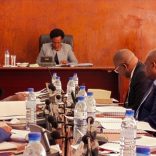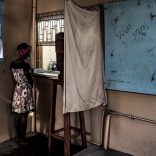Thousands fleeing Mozambique violence: UN
Mozambique: Raising questions at the top; war continues with arms from riot police – By Joseph Hanlon

Image: Google Maps
In this issue
Raising questions at the top
- Nyusi: high costs of free market
- Nepotism in army – jobs, not fighters
Cabo Delgado war
- Fighting continues in 8 districts
- Weapons, food from riot police raids
Raising questions at the top
- Nyusi 1 – the high cost of economic liberalisation
“Economic liberalisation and the adoption of the market economy has led some to forget their main mission of defending the interests of the party and the people,” President Filipe Nyusi told a Frelimo meeting on 24 August. They only satisfy personal interests, forgetting the need to defend the people. He was specifically looking back at changes made in the 1990s. (AIM, MediaFax 25 Aug)
In the early 1990s, at the end of Cold War, the IMF, World Bank said they would help Mozambique rebuild after the 1980s proxy war imposed by the US had killed a million Mozambicansand destroyed the economy. But the condition was that Mozambique accept the same “shock therapy” that was being imposed on the countries of the former Soviet Union. Greed and oligarchs were the result, in Mozambique as elsewhere. And Nyusi admitted this was having an impact, creating space for the war in Cabo Delgado.
- Nyusi 2 – Free market hurts small farmers
The maize producer is paid $180 per tonne of maize, but the price of maizemeal in Maputo is $900 per tonne, said President Filipe Nyusi at the opening a maize mill in Nampula city on 25 August. (AIM, 26 Aug) The free market means most of the final sale price is profit for millers and traders.
Indeed, $180 per tonne is not enough to pay the costs of production. A tonne of maize needs 100 kg of fertiliser, now more than $100, plus tilling and weeding of the land. Other countries such as Zimbabwe have a floor price for maize which keeps it above production costs and profitable for commercial production. There are no floor prices in Mozambique, so maize and rice have rarely been commercial crops in Mozambique.
Nyusi also opened an vegetable oil factory on 18 August in Cuamba which he said would reduce imports and stimulate agricultural production. (AIM 19 Aug) But 15 years ago we wrote about a factory in Chimoio producing oil from local sunflower seed which had stimulated production. But the factory was put out of business by cheaper imported palm oil. (“Do Bicycles equal development in Mozambique?, by Joseph Hanlon and Teresa Smart, 2008, fn 13, p 171. Available free on http://bit.ly/Hanlon-books but only in Portuguese. Still on sale in English.)
Without government support or protection, will another new factory close in the face of competing imports? This is how the free market works, and it is not enough to build factories for the president to open. Government must intervene in the market. jh
- Reserve commander – army gives jobs to Frelimo instead of creating soldiers
“The army must recruit in order to wage war. But what happens today is that we recruit in order to give people jobs. I recruit my son because I can’t educate him, so I send him into the army or the police. Then, when I hear that he’s being sent to Cabo Delgado, I do everything to take his name off the list”, said David Munongoro, commander of the reservists in the Mozambican Armed Forces (FADM). He was head of the military police for 12 years, and also deputy commander of the Higher Institute of Defence Studies. He was speaking to reporters during a Scientific Conference in Maputo on defence and security.
Current procedures for recruiting soldiers to the FADM do not produce the kind of army needed in the fight against insurgents in Cabo Delgado. Instead of nepotism in military recruitment to create jobs, the army needs to recruit people to fight the war. It is up to the State to motivate the troops by providing them with decent conditions, Munongoro added. “There should be good quality food, good equipment, good pay. And when I speak of good pay, I’m not just talking about wages, I’m also including life insurance because in the event of his death, a soldier must be sure that his family will be well looked after”. (AIM 25 Aug)
Cabo Delgado war
- Insurgency continues in 8 districts
Fighting continued in July and August with attacks in Palma and Mocimboa da Praia districts, near the district towns, in the gas zone which is supposed to be safe. Between 18 and 21 August, multiple incidents were recorded in Palma District, including an 18 August attack on the village of Nhica do Rovuma, 30 kilometres from Palma Town.
There have been other attacks in Meluco, Ancuabe, Macomia, Muidumbe, Montepuez, and Nangade districts. The number of incidents in June was the highest for two years. (Zitamar 30 Aug, Focus Group 26 August, MediaFax 23 Aug, Cabo Ligado monthly 16 Aug)
Displaced people and traders are slowly returning to Palma and Mocimboa da Praia.
- Raids on riot police supply insurgency
The supposedly elite para-military riot police (UIR, Unidade de Intervençao Rapido) have been attacked so often in Nangade district that “a significant part of the insurgent weaponry in Cabo Delgado has been taken from the military and police”, reports Armando Nhantumbo in a detailed article in Savana (26 August). Attacks frequently occur just when a base is being supplied with food, suggesting the information is leaking to the insurgents.
On 18 August insurgents attacked near Mocimboa da Praia town with mortars they had taken from a Mandimba, Nangade, army base, two weeks before. The Mandimba base had been attacked just as food was being delivered, and the soldiers fled when the attack started,; one soldier was killed, Savana reports.
On 19 August, the UIR base in Litingina village, Nangade, was told that by the local village head that insurgents were coming. So they fled. A ground of eight insurgents stripped the base, taking weapons, ammunition and food.
The UIR based in Namwembe, Nangade, has been raided three times. The 18 July attack was just when the UIR food supply truck was arriving.
By Joseph Hanlon












Leave a Reply
Be the First to Comment!
You must be logged in to post a comment.
You must be logged in to post a comment.